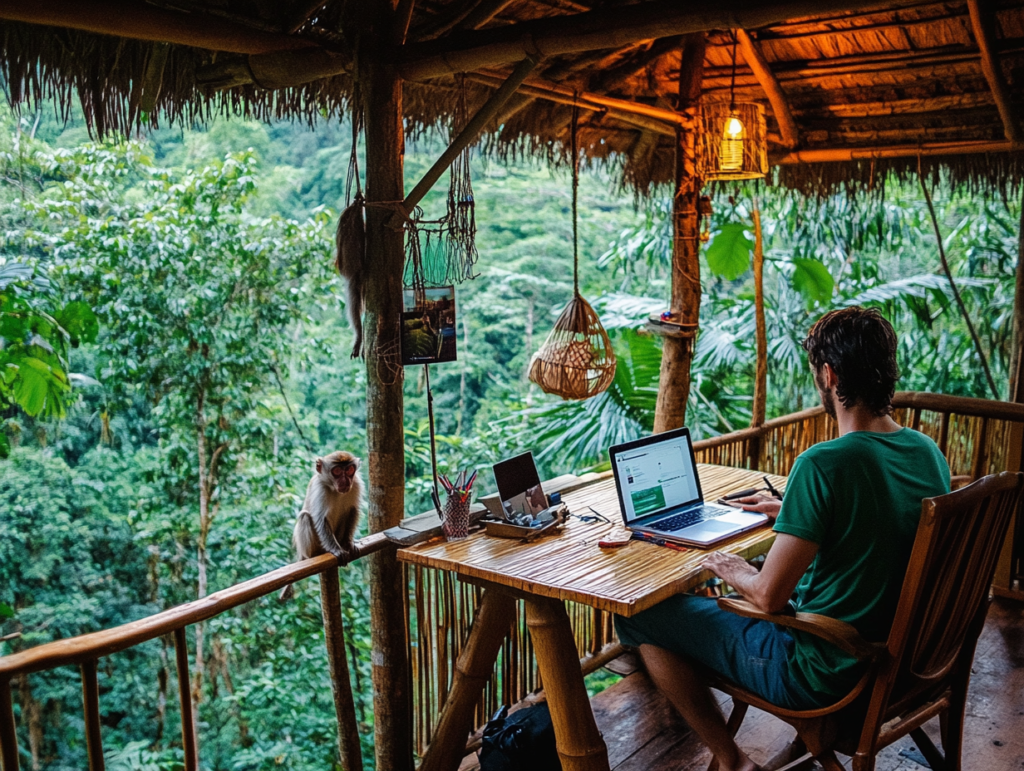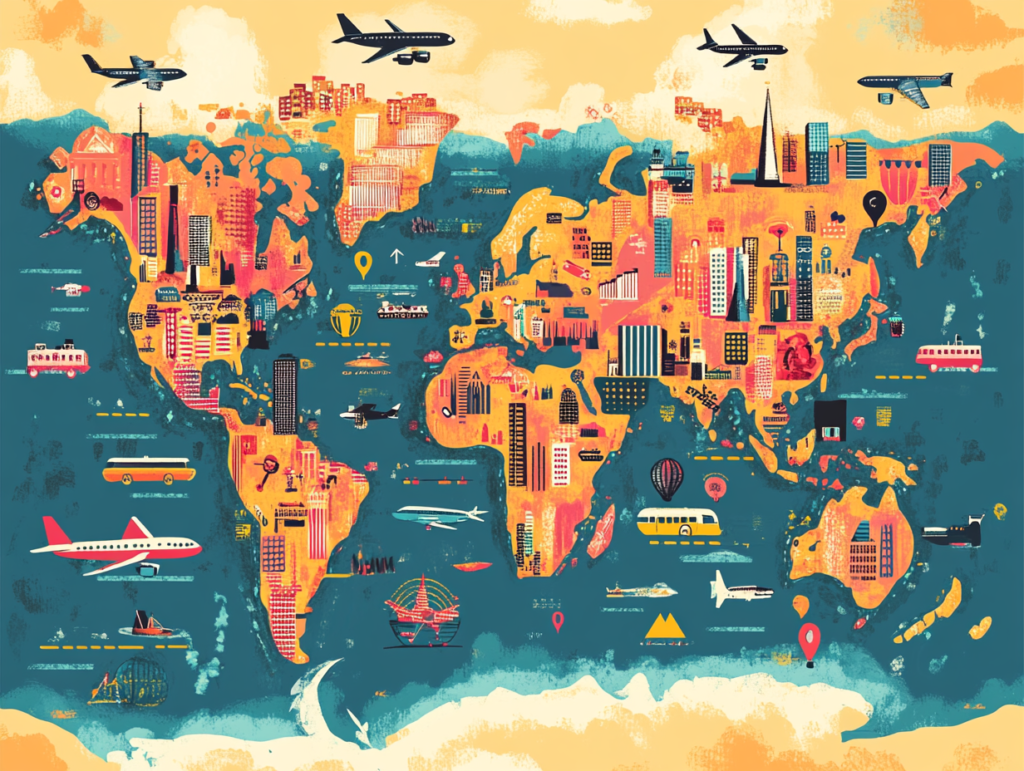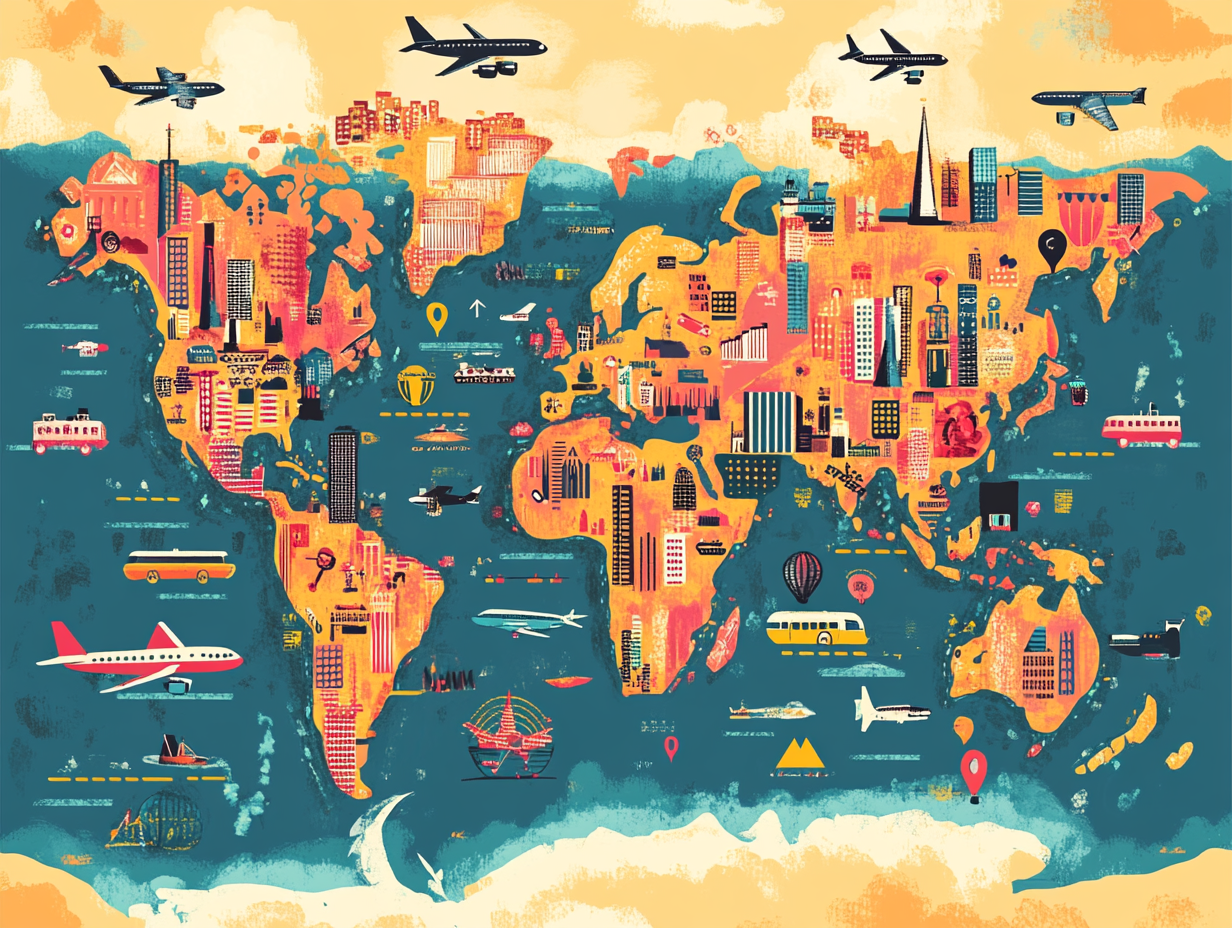The concept of digital nomadism has gained significant traction in recent years, reflecting a transformative shift in how individuals approach work and travel. Digital nomads are people who leverage technology to conduct their work remotely while exploring diverse locations around the globe. This lifestyle allows them to merge professional commitments with enriching travel experiences, resulting in a dynamic and fulfilling way of life.
The rise of remote work has been fueled by advancements in technology, particularly the proliferation of high-speed internet, cloud computing, and communication tools. These innovations have made it easier for professionals to stay connected and productive regardless of their physical location. As companies increasingly embrace flexible work arrangements, more individuals are seizing the opportunity to break free from traditional office environments and venture into the world as digital nomads.
The benefits of this lifestyle are manifold. Flexibility stands out as a primary advantage, allowing digital nomads to design their schedules in a way that aligns with their personal and professional goals. This flexibility can contribute to a healthier work-life balance, as individuals can allocate time for exploration and leisure alongside their work responsibilities. Additionally, sheaving the constraints of a fixed location often leads to exposure to diverse cultures, enhancing both personal growth and professional development. Engaging with various communities while working in different cities cultivates a global mindset that can be invaluable in today’s interconnected world.
Furthermore, the sense of adventure inherent in digital nomadism motivates individuals to constantly learn and adapt. By immersing themselves in new environments, digital nomads often develop a richer understanding of global perspectives, which can translate into innovative insights within their work. As this culture continues to expand, more individuals are expected to embrace the freedom and opportunities presented by a lifestyle that harmoniously blends work and travel.

Criteria for Choosing the Best Digital Nomad Cities
When evaluating the optimal cities for digital nomads, several key factors come into play, each significantly influencing the overall experience of working and traveling. Firstly, the cost of living is paramount; it encompasses housing, food, transportation, and other daily expenses. Cities that offer affordable living options allow digital nomads to allocate more resources toward their travels and experiences rather than essential living costs. Thus, a careful analysis of pricing in potential cities can make a substantial difference.
Another crucial aspect is internet connectivity. As most digital nomads rely on stable and fast internet to work remotely, cities providing accessible Wi-Fi and reliable mobile networks are preferable. This ensures that work commitments can be met without hassle, enabling professionals to maintain productivity while exploring new locales.
The availability of coworking spaces further enhances the appeal of a city. These facilities not only offer the infrastructure needed for effective work but also foster a sense of community among fellow digital nomads. The collaboration and networking opportunities found in coworking environments can be invaluable for career growth and personal connections.
Safety is an essential criterion, as digital nomads seek environments where they can feel secure. Cities with lower crime rates and good healthcare services contribute positively to the overall experience, allowing individuals to focus on their work and leisure without concern for their wellbeing.
Furthermore, cultural richness and local lifestyle can impact the attractiveness of a city. Engaging with local culture can enhance a digital nomad’s experience, allowing for greater immersion in the community. Climate also plays a vital role; cities that offer a pleasant climate year-round can enhance motivation and productivity while avoiding adverse weather conditions.
Lastly, overall accessibility, including transport options and visa regulations, can significantly influence the ease of settling and working in a particular city. Cities that provide seamless travel and entry for remote workers often emerge as more appealing destinations for digital nomads.
Top Digital Nomad Hotspots in 2025
As we delve into the evolving world of remote work, it becomes crucial for digital nomads to find cities that not only foster productivity but also offer an enriching lifestyle. In 2025, several cities are poised to stand out as prime destinations for those seeking the perfect blend of work and adventure.
Firstly, Bali, Indonesia continues to capture the hearts of many digital nomads. Known for its breathtaking landscapes and vibrant culture, Bali offers a plethora of coworking spaces that cater to remote workers. The cost of living is relatively low, allowing nomads to enjoy a comfortable lifestyle while exploring the island’s natural beauty and unique traditions.
Moving to Europe, Lisbon, Portugal emerges as a major hotspot. The city boasts a rich historical backdrop, stunning architecture, and a thriving community of remote workers. With an array of coworking environments, Lisbon provides the ideal setting for productivity. The affordability compared to other Western European capitals, combined with a warm climate, makes it an attractive destination for those working remotely.
Mexico City, Mexico is another city on the rise. Known for its diverse culture, culinary delights, and bustling urban life, this metropolis offers a dynamic network of coworking facilities. Nomads are drawn to the city’s mix of affordability and vibrancy, where they can immerse themselves in the local culture while maintaining their work commitments.
In Asia, Chiang Mai, Thailand remains a beloved choice for many digital nomads. This city is famous for its peaceful surroundings, affordable living, and friendly expat community. Chiang Mai’s coworking spaces create a collaborative atmosphere, encouraging professional growth and networking, all while enjoying a holistic lifestyle.
Finally, Berlin, Germany stands out as a creative hub known for its art scene and innovative tech startups. The city’s established coworking options cater well to the needs of digital nomads, and it offers a variety of cultural experiences. With a moderate cost of living, Berlin invites nomads to thrive both professionally and personally.
These cities represent a mix of established favorites and emerging destinations that cater to the lifestyle preferences of today’s digital nomads. Each location provides its unique charm, promising new adventures while allowing for a fulfilling work-life balance.

A Day in the Life of a Digital Nomad
Imagine waking up to the gentle sound of waves crashing against the shore, sunlight filtering through the curtains of your beachfront apartment in Bali. As a digital nomad, your day begins with a refreshing morning routine accompanied by a nutritious breakfast of local fruits and coffee sourced from nearby cafes. The flexibility of remote work allows you to savor these moments before diving into your professional responsibilities.
After breakfast, you set up your laptop on the terrace, where the ocean breeze invigorates your concentration. Your work obligations involve a mix of team meetings and project management tasks, which you tackle efficiently. Utilizing coworking spaces is a popular option among digital nomads, yet today, you choose the tranquility of your home environment for increased productivity. This location independence facilitates a personalized workspace tailored to your comfort and inspires creativity.
As midday approaches, you schedule a break to engage with other nomads at a nearby café. This social interaction is a significant aspect of nomadic life; sharing experiences and networking with like-minded individuals enriches your journey. In such vibrant ecosystems, conversations often revolve around travel tips, business opportunities, and new partnerships, paving the way for memorable friendships.
Post-lunch, your work continues, possibly involving video calls with colleagues from different time zones. The beauty of this lifestyle is the ability to manage your schedule around personal interests. As evening descends, you dedicate time to exploring the local culture, sampling street food, and attending cultural events, instances that deepen your connection to your temporary home.
As day turns to night, journaling your experiences becomes a cherished habit, allowing reflection on the day’s accomplishments and learnings. Embracing the digital nomad lifestyle entails challenges, yet the rewards of new perspectives and adventures often outweigh them, making each day an exciting opportunity for growth. The continuous blend of work and exploration defines your life, revealing the endless possibilities of living and working from anywhere in the world.
Tips for Thriving as a Digital Nomad
Embracing the digital nomad lifestyle can be exhilarating, offering the freedom to explore new cities while working remotely. However, to thrive in this unique environment, it is essential to adopt effective strategies that bolster both productivity and personal well-being. One of the key aspects of maintaining productivity while traveling is to establish a consistent work routine. This might involve creating a dedicated workspace and setting specific work hours that align with your goals and commitments, allowing for focused work periods interspersed with exploration and leisure.
Building a local community is another crucial element of a successful nomadic experience. Engaging with fellow digital nomads and local residents can provide invaluable support and networking opportunities. Platforms such as Meetup or co-working spaces are excellent places to connect with like-minded individuals, create friendships, and share resources. Participating in workshops, classes, or social events can further enhance your experience, encouraging personal growth and local engagement.
Time zone management is often a challenge for digital nomads, especially when collaborating with clients or colleagues in different parts of the world. To navigate this, it is advisable to use tools like world clocks or apps that facilitate communication across various time zones. Setting clear expectations with clients regarding your availability can help mitigate misunderstandings and ensure everyone is on the same page.
Lastly, staying connected is essential for remote work success. Ensuring reliable internet access is fundamental, so consider investigating local networks and purchasing SIM cards tailored for data needs. Tools such as Slack, Zoom, or project management software can facilitate seamless communication with clients or coworkers, ensuring your workflow remains uninterrupted. By implementing these strategies, digital nomads can thrive in their journey, balancing work demands with the joys of exploration.
Cultural Considerations and Adaptation
For digital nomads venturing into new cities, cultural sensitivity and adaptation are vital components of the experience. The process of immersing oneself in a different culture presents both challenges and rewards that can significantly shape a nomad’s journey. Understanding and respecting local customs not only enhances personal experiences but also fosters meaningful interactions with the community.
One of the primary challenges faced by digital nomads is navigating cultural differences. Each destination has its unique social norms, traditions, and communication styles. For instance, in some cultures, direct communication is valued, while in others, it may come across as disrespectful. As such, being open-minded and willing to learn is essential. Engaging with sources like blogs, documentaries, and cultural workshops can provide invaluable insights into the local way of life.
Moreover, actively participating in local customs demonstrates respect and willingness to connect. Simple gestures, such as learning a few phrases in the local language, can make a significant difference in how locals perceive and interact with a digital nomad. Additionally, attending community events or volunteering can further bridge the cultural gap, allowing for richer interactions that transcend the typical traveler experience.
To facilitate cultural integration, digital nomads should approach unfamiliar situations with curiosity rather than judgment. Tuning into local gestures, traditions, and behaviors can create opportunities for meaningful conversations and lasting relationships. Likewise, understanding aspects like dining etiquette, dress codes, and social norms is crucial in avoiding misunderstandings.
In conclusion, cultural sensitivity is not just about observing customs; it requires active engagement and a willingness to adapt. By embracing these principles, digital nomads can transform transient stays into enriching experiences, ultimately enhancing both their professional and personal growth in the host city.

Working from Different Cities: Legal and Visa Considerations
Digital nomadism continues to gain momentum, offering individuals the flexibility to work remotely while traveling the globe. However, one essential aspect often overlooked is the legal and visa considerations associated with working from different cities. Each country has its own regulations, which significantly impacts the digital nomad lifestyle. A thorough understanding of these legal aspects is crucial to ensuring a smooth transition and operating within compliance.
When considering moving to a new city, an important first step is to determine the appropriate visa type for your stay. Many countries are increasingly recognizing the value of remote workers and have begun to offer specific visas tailored for digital nomads. These visas typically allow individuals to reside in the country for extended periods while working remotely for non-local companies. For example, countries such as Portugal, Croatia, and Germany have introduced specific programs aimed at attracting remote workers, facilitating easier entry compared to traditional work visas.
In addition to obtaining the appropriate visa, it’s important to consider work permits if applicable. While some digital nomad visas may not require a separate work permit, others could have specific stipulations that must be adhered to. Additionally, ensure you are familiar with taxation laws, as liability to pay taxes may arise depending on the length of your stay and the local regulations of the host country.
Navigating the bureaucratic processes involved in acquiring visas and permits can be daunting. It is advisable to consult local embassies or legal advisors specializing in immigration to clarify any potential issues, as well as to stay informed about changes in policies that could affect your status as a digital nomad. Securing proper documentation not only allows you to focus on your work and travel but also helps avoid legal pitfalls while enjoying the freedom of remote work.

Health and Safety for Digital Nomads
As digital nomads traverse the globe, prioritizing health and safety becomes paramount to ensure a fulfilling experience. A fundamental aspect of this is health insurance. Digital nomads should obtain comprehensive health insurance that covers international medical emergencies. Many insurance providers offer packages tailored specifically for nomadic lifestyles, ensuring coverage in various countries. It’s crucial to review policy terms carefully, including coverage limits, exclusions, and evacuation options. Additionally, some insurance companies include telehealth services, allowing easy access to consultations from anywhere in the world.
Vaccination requirements are another critical consideration for digital nomads. Researching the destinations beforehand will provide insights into necessary vaccinations. Some countries may require proof of vaccination for diseases such as Yellow Fever, while others recommend vaccines like Hepatitis A and Typhoid, especially for travelers planning to explore rural areas. Keeping an updated vaccination record can facilitate entry into various countries while also aiding in securing potential medical treatment abroad.
Safety tips are essential to navigating unfamiliar environments. Digital nomads should remain aware of their surroundings, particularly in crowded or tourist-heavy areas. Utilizing trusted transportation options, sharing itineraries with friends or family, and securing accommodations through reputable platforms can enhance personal safety. It’s also advisable to carry essential items such as emergency contacts and local emergency numbers.
Access to medical care varies significantly across different countries; hence, knowing how to seek medical assistance is vital. Researching local healthcare systems and identifying nearby hospitals or clinics upon arrival can streamline access in the event of an emergency. Many countries have private healthcare facilities that offer high-quality services, but these may require upfront payment or health insurance coverage.
Through meticulous planning for health and safety, digital nomads can navigate their journeys with confidence, embracing both work and travel opportunities while safeguarding their well-being.
Embracing the Digital Nomad Lifestyle in 2025
As we look ahead to 2025, the allure of the digital nomad lifestyle continues to grow, fueled by advancements in technology and a shift in workplace dynamics. The cities highlighted in this blog post offer a mix of vibrant culture, reliable internet connectivity, and an array of amenities tailored to the needs of remote workers. From the bustling streets of Lisbon to the tranquil beaches of Bali, these hotspots represent the diverse opportunities available to individuals seeking to combine work and travel.
The evolving nature of work—spurred on by the recent global shifts in how businesses operate—opens up a world of possibilities for aspiring digital nomads. The rise of remote work means that professionals now have the freedom to choose their work environment, allowing for a lifestyle that balances personal interests with career aspirations. This shift not only fosters a sense of independence but also invites individuals to explore new cultures and experiences, enriching their personal and professional lives.
Moreover, the key to embracing this lifestyle lies in preparation and mindset. Individuals are encouraged to assess their skills, identify potential job opportunities, and research destinations that align with their personal and professional goals. Establishing clear criteria, such as cost of living, community support, and available resources, will help streamline the selection process. By adapting to a nomadic lifestyle, one can gain a fresh perspective on life and career, fostering growth and resilience.
In conclusion, with the right mindset and adequate preparation, anyone can embrace the thrilling journey of being a digital nomad in 2025. As work continues to transcend traditional boundaries, each aspiring remote worker has the potential to explore the world while maintaining their professional ambitions. The future is bright for those willing to take the leap into this exciting lifestyle, offering unparalleled opportunities for personal and professional development.
